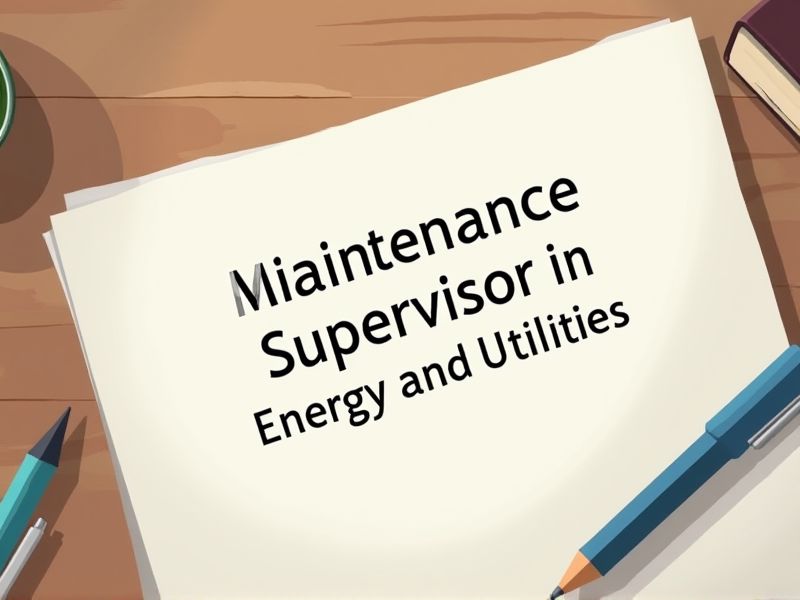
The role of a Maintenance Supervisor in the Energy and Utilities sector demands proficiency due to its complex systems and critical infrastructure. Certifications ensure supervisors possess the necessary technical skills and safety knowledge, which are vital for maintaining operational efficiency and reducing downtime. Without proper certifications, there could be increased risks of equipment failure and safety incidents. Here are some important certifications needed for a Maintenance Supervisor in Energy and Utilities.
Certified Maintenance and Reliability Professional (CMRP)
The CMRP certification equips a Maintenance Supervisor in the Energy and Utilities sector with standardized knowledge, which promotes effective maintenance management practices. Possessing this certification often leads to improved reliability and efficiency of the equipment, reducing operational costs and downtimes. It enhances the supervisor's ability to implement predictive maintenance strategies, backed by a recognized framework. Over time, the certification supports compliance with industry regulations and safety standards, fostering trust and credibility within the organization.
Certified Energy Manager (CEM)
A Certified Energy Manager (CEM) brings specialized knowledge in optimizing energy use, leading to cost savings for facilities. With the growing emphasis on sustainability, having a CEM ensures compliance with regulatory standards and access to incentives. Data shows that facilities managed by CEMs typically see a reduction in energy consumption, improving operational efficiency. In the rapidly evolving energy sector, a CEM equips maintenance supervisors with the skills to innovate and implement cutting-edge solutions.
OSHA 30-Hour General Industry Certification
The OSHA 30-Hour General Industry Certification equips a maintenance supervisor with a comprehensive understanding of workplace safety standards, crucial for managing risks in the energy and utilities sector. Proper safety training reduces the incidence of accidents and injuries, leading to enhanced operational efficiency and lower compensation costs. Knowledge from this certification supports compliance with federal safety regulations, which is essential in this heavily regulated industry. Having certified supervisors fosters a culture of safety, positively impacting employee morale and productivity.
NFPA 70E Electrical Safety in the Workplace Certification
NFPA 70E certification ensures that a maintenance supervisor in energy and utilities understands the standards for electrical safety, significantly reducing the risk of workplace accidents. Possession of this certification indicates the supervisor's competence in identifying electrical hazards and implementing best practices for worker safety. It also ensures compliance with OSHA regulations, minimizing legal risks and potential fines for the organization. As a result, the certification enhances workforce productivity by ensuring a safer working environment.
Six Sigma Green Belt Certification
Maintenance supervisors in energy and utilities often handle complex systems where inefficiencies can lead to significant cost overruns. Six Sigma Green Belt certification provides them with rigorous analytical tools to identify and reduce process variability, improving operational efficiency. With these skills, supervisors can better manage resources and reduce downtime, resulting in consistent and reliable service delivery. Enhanced problem-solving capabilities also empower supervisors to implement data-driven decisions that align with strategic business goals.
Certified Plant Maintenance Manager (CPMM)
The Certified Plant Maintenance Manager (CPMM) credential equips maintenance supervisors with advanced skills in asset management critical for maximizing equipment reliability in the energy and utilities sector. A CPMM-certified supervisor can efficiently oversee predictive maintenance practices that reduce downtime and operational costs, aligning with industry standards. Enhanced knowledge of regulatory compliance and safety standards ensures that plants operate within legal frameworks, minimizing the risk of violations and fines. The certification fosters strategic thinking and leadership capabilities necessary for managing complex maintenance teams and projects in dynamic energy environments.
API 510 Pressure Vessel Inspector Certification
The API 510 Pressure Vessel Inspector Certification equips a Maintenance Supervisor in Energy and Utilities with specialized knowledge in pressure vessel inspection practices. This certification ensures the supervisor can effectively identify and mitigate risks associated with vessel operation, reducing downtime and enhancing operational safety. Holding this credential demonstrates a commitment to maintaining industry standards, which can improve credibility and trust among peers and stakeholders. As regulatory compliance becomes more stringent, certified supervisors contribute to meeting these requirements, ensuring continued operation within legal frameworks.
Project Management Professional (PMP)
Maintenance supervisors in the energy and utilities sector manage complex systems that require efficient project management to minimize downtime and maintain operational efficiency. PMP certification equips supervisors with standardized methodologies and tools, leading to better project execution and resource allocation. This certification enhances risk management capabilities, crucial for preventing costly disruptions and ensuring compliance with industry standards. More effective communication and stakeholder management skills derived from PMP training improve coordination between teams and departments, leading to more consistent maintenance outcomes.
Certified Reliability Engineer (CRE)
Certified Reliability Engineers (CRE) enhance predictive maintenance strategies, reducing unexpected downtimes in energy and utility operations. Their expertise in reliability analysis helps optimize equipment lifespan, leading to cost savings and efficient resource allocation. CREs utilize data-driven decision-making to identify potential failures, improving overall safety and operational reliability. By integrating reliability principles, maintenance supervisors can achieve sustainable performance and compliance with industry standards.
Lean Manufacturing Certification
Lean Manufacturing Certification equips a Maintenance Supervisor in the Energy and Utilities sector with skills to streamline processes, which leads to enhanced operational efficiency. This efficiency improves response time during critical maintenance tasks, ultimately reducing downtime and maintenance-related costs. Understanding Lean principles enables the supervisor to identify and eliminate waste, resulting in more sustainable and cost-effective practices. A certified maintenance supervisor can better align maintenance activities with the overall strategic objectives of the organization, ensuring compliance with industry standards and regulations.
Summary
By obtaining certifications, you enhance your expertise in industry-specific skills and best practices. These credentials can lead to increased efficiency and effectiveness in your maintenance operations. Certified supervisors often experience improved job performance and may unlock career advancement opportunities. Your organization might also benefit from reduced downtime and increased equipment reliability.
